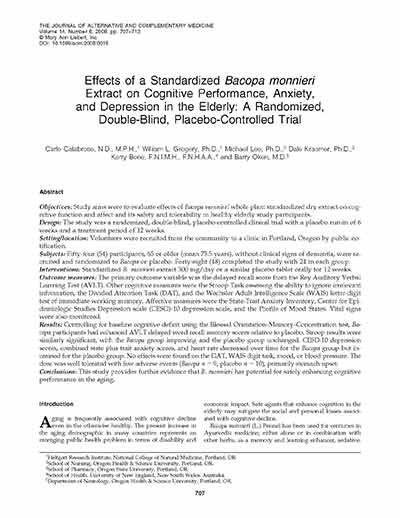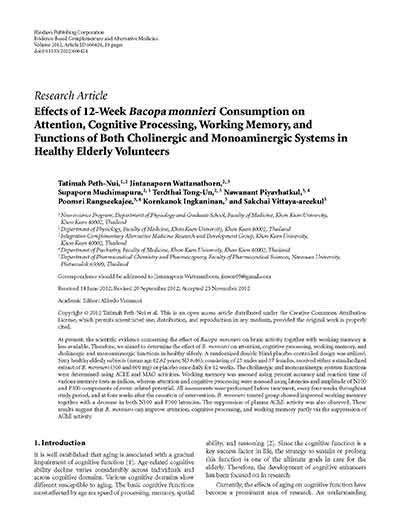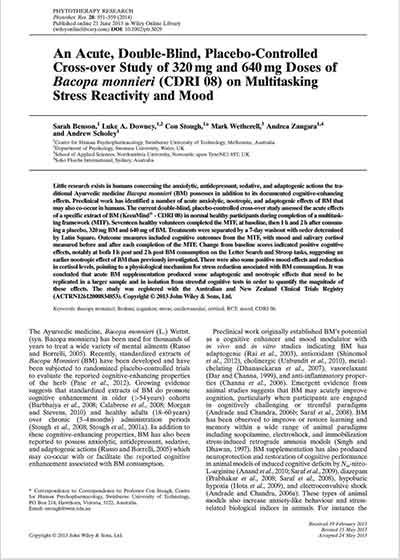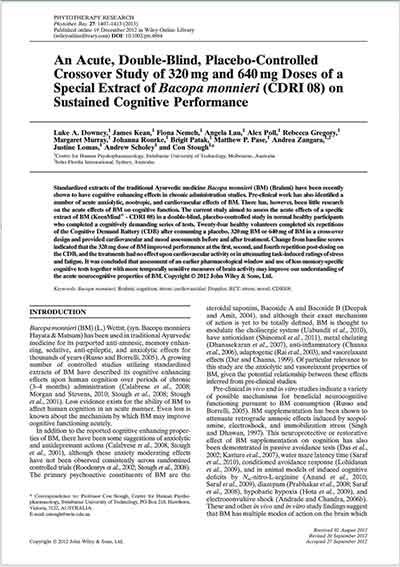Safely enhancing cognitive performance in the aging.

Effects of a Standardized Bacopa monnieri Extract on Cognitive Performance, Anxiety,and Depression in the Elderly: A Randomized, Double-Blind, Placebo-Controlled Trial
Abstract
Objectives: Study aims were to evaluate effects of Bacopa monnieri whole plant standardized dry extract on cognitive function and affect and its safety and tolerability in healthy elderly study participants.
Design: The study was a randomized, double-blind, placebo-controlled clinical trial with a placebo run-in of 6 weeks and a treatment period of 12 weeks.
Setting/location: Volunteers were recruited from the community to a clinic in Portland, Oregon by public notification.
Subjects: Fifty-four (54) participants, 65 or older (mean 73.5 years), without clinical signs of dementia, were recruited and randomized to Bacopa or placebo. Forty-eight (48) completed the study with 24 in each group.
Interventions: Standardized B. monnieri extract 300 mg/day or a similar placebo tablet orally for 12 weeks.
Outcome measures: The primary outcome variable was the delayed recall score from the Rey Auditory Verbal Learning Test (AVLT). Other cognitive measures were the Stroop Task assessing the ability to ignore irrelevant information, the Divided Attention Task (DAT), and the Wechsler Adult Intelligence Scale (WAIS) letter-digit test of immediate working memory. Affective measures were the State-Trait Anxiety Inventory, Center for Epidemiologic Studies Depression scale (CESD)-10 depression scale, and the Profile of Mood States. Vital signs were also monitored.
Results: Controlling for baseline cognitive deficit using the Blessed Orientation–Memory–Concentration test, Bacopa participants had enhanced AVLT delayed word recall memory scores relative to placebo. Stroop results were similarly significant, with the Bacopa group improving and the placebo group unchanged. CESD-10 depression scores, combined state plus trait anxiety scores, and heart rate decreased over time for the Bacopa group but increased for the placebo group. No effects were found on the DAT, WAIS digit task, mood, or blood pressure. The dose was well tolerated with few adverse events (Bacopa n=9, placebo n=10), primarily stomach upset.
Conclusions: This study provides further evidence that B. monnieri has potential for safely enhancing cognitive performance in the aging.
Source:The Journal of Alternative and Complementary Medicine Volume 14, Number 6, 2008, pp. 707–713






